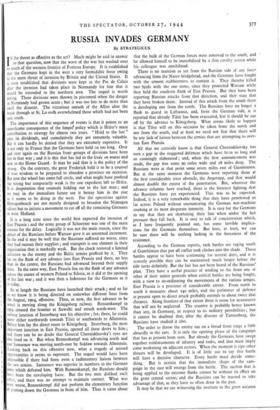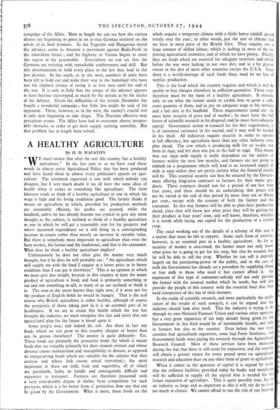RUSSIA INVADES GERMANY
By STRATEGICUS
IS the threat as effective as the act? Much might be said in answer to that question, now that the wave of the war has washed over so much of the western frontier of Fortress Europe. It is established that the Germans kept in the west a very formidable force owing to the mere threat of invasion-by Britain and the United States. It is even established that divisions were kept in the Pas de Calais after the invasion had taken place in Normandy for fear that it would be extended to the northern area. The sequel is worth noting. These divisions were thrown in piecemeal when the danger in Normandy had grown acute ; but it was too late to do mOre than swell the disaster. The victorious onrush of the Allies after the break through at St. Lo even overwhelmed those which had not been sent south.
The importance of this sequence of events is that it points to an unwelcome consequence of the 'impel' policy which is Hitler's main contribution to strategy for almost two years. "Hold to the last" pays its dividends, and cumulatively they are extremely valuable. But it can hardly be denied that they are extremely expensive. It is not only in France that the Germans have held on too long. Over and over again on the Russian front groups of divisions have been lost in that way ; and it is this that has led to the levee en masse and now to the Home Guard. It may be said tlaat it is the policy of the strong. On the contrary, the great Frederick held it to be a counsel of true wisdom to be prepared to abandon a province on occasion. But now the wheel has come full circle, and what might have profited the strong but temporarily weak is the one expedient left to Hitler. It is desperation that counsels holding out to the last man ; and we may in the immediate future see it betray him in the east as it seems to be doing in the west. For the operations against Hertogenbosch are not merely designed to broaden the Nijmegen salient but to initiate a movement to cut off all the remaining Germans in west Holland.
It is a long time since the world first expected the invasion of East Prussia ; and the army group of Schoerner was one of the main reasons for the delay. Logically it was not the main reason, since the defeat of the Russians before Warsaw gave it an unearned increment. In the end it may be well that the Russians suffered no worse, since they had outrun their supplies ; and transport is one element in their organisation that is markedly weak. But the check restored a limited initiative to the enemy and the Baltic armies profited by it. They lay on the flank of any advance into East Prussia and there, no less than in the centre, the Russians had advanced beyond their supply train. In the same way, East Prussia lies on the flank of any advance across the centre of western Poland to Silesia, as it did at the opening of the last war ; and it was then a lodestone for the Germans as it is today.
So at length the Russians have launched their attack ; and so far as we know it is being directed on somewhat different lines from the August, 1914, offensive. Then, as now, the first advance to be noted is moving along the Konigsberg railway. Rennenkampf in 1914 crossed the frontier at Suwalki and struck north-west. The railway junction of Insterburg was his objective ; for, there, he could move either northwards towards Tilsit or southwards to Allenstein. Before him lay the direct route to Konigsberg. Insterburg, the most important junction in East Prussia, opened all these doors to him ; and there can be no doubt that General Cherniakhovsky's eyes are also fixed on it. But when Rennenkampf was advancing north and east Sarnsonov was moving north-east by Soldaw towards Allenstein. Looking back on this offensive now, what a tragedy of missed Opportunities it seems to represent. The sequel would have been impossible if there had been even a rudimentary liaison between the two armies. Samsonov was superior in numbers to the German army which defeated him. With Rennenkampf, the Russians should have been the enveloping force. But the two men disliked each other, and there was no attempt to maintain contact. What was even worse, Rennenkampf did not perform the elementary function of pinning down the Germans in front of him. Thus it came about
that the bulk of the German forces were removed to the south, and he allowed himself to be immobilised by a thin cavalry screen while his colleague was annihilated.
There is no mention as yet from the Russian side of any force advancing from the Narev bridgehead, and the Germans have fought with the utmost stubbornness to contain it. They thereby killed two birds with the one stone, since they protected Warsaw while they held the southern flank of East Prussia. But they have been reporting Russian attacks from that direction, and they state that they have broken them. Instead of this attack from the south there is developing one from the north. The Russians have no longer a flank to guard in Lithuania, and, from the German side, it is reported that already Tilsit has been evacuated, lest it should be cut off by the advance to Konigsberg. What seems likely to happen is that Tilsit will on this occasion be taken from the north and not from the south, and at least we need not fear that there will be any lack of liaison between the armies that are attempting to over- run East Prussia.
All that we certainly know is that General Cherniakhovsky has torn a gap in the staggered defences which have hem so long and so cunningly elaborated ; and, when the first announcement was made, the gap was some 90 miles wide and 18 miles deep. The Russians were at that point some seven miles east of Gumbinnen. But at the same moment the Germans were reporting them at the first considerable river obstacle, the Angerapp, and that would almost double the extent of the penetration. But, wherever the advance columns have reached, there is the bitterest fighting that the Russians have yet experienced. This was to be expected. Indeed, it is a very remarkable thing that they have penetrated so far across Poland without encountering the German war-machine working at its most desperate intensity. It is easy for the Germans to say that they are shortening their line when under the last pressure they fall back. It is easy to talk of concentration which, as I have frequently pointed out, has some terrible implica- tions for the Germans themselves. But here, at least, we can be sure there will be nothing lacking in the fierceness of the resistance.
According to the German reports, tank battles are raging south of Gumbinnen that put all earlier tank clashes into the shade. These battles appear to have been continuing for several days, and it is scarcely possible they can be maintained much longer before the tide turns definitely. But the last has not been heard of the Russians' plan. They have a useful practice of sending to the front one or other of their senior generals when critical battles are being fought, with a view to co-ordinating the movements of the various armies. East Prussia is a province of considerable extent. From north to south it measures about 140 miles, and the perimeter of defence at present open to direct attack probably extends to about twice that distance. Along frontiers of that extent there is room for manoeuvre that will not be neglected. The country is probably better known than any, in Germany, in respect to its military possibilities ; but it cannot be doubted that, -after the disaster of Tannenberg, the Russians have studied it also.
The order to throw the enemy out on a broad front rings a little absurdly in the ears. It is only the opening phase of the campaign that has at present been seen. But already the Germans have swept together reinforcements of infantry and tanks, and that must imply some weakening on adjacent sectors. When the moment is ripe other thrusts will be developed. It is of little use to say this battle will have a decisive character. Every battle must decide some- thing. But is oertain that the immediate shape of the cam- paign in the east will emerge from the battle. The suction that is being applied to the extreme flanks cannot be without its effect on the great central sector; and the Russians can be trusted to take advantage of that, as they have so often done in the past.
It may be that we are witnessing the overture to the great autumn
campaign of the Allies. Now at length we can see how the various thrusts are beginning to press in on to true German territory on the whole of its land frontiers. In the Yugoslav and Hungarian sector the advance seems to threaten a movement against Buda-Pesth in the immediate future ; and the highway to Vienna begins to enter the region of the practicable. Everywhere we can see that the Germans are resisting with remarkable stubbornness and skill. But this determination to hold every place to the last may lead to the last disaster. In the south, as in the west, numbers of units have been left to hold out and make their way to the homeland who have not the slightest chance of seeing it as free men until the end of the war. It is only in Italy that the tempo of the advance appears to have become stereotyped, as much by the terrain as by the tactics of the defence. Given the difficulties of the terrain Alexander has fought a wonderful campaign ; but little' less might be said of his opponent. There, however, as in the west, the enemy's crucial test is only now beginning to take shape. The Prussian offensive may precipitate events. The Allies have had to overcome almost insuper- able obstacles in order to get their supply running smoothly. But that problem has at length been solved.



























 Previous page
Previous page